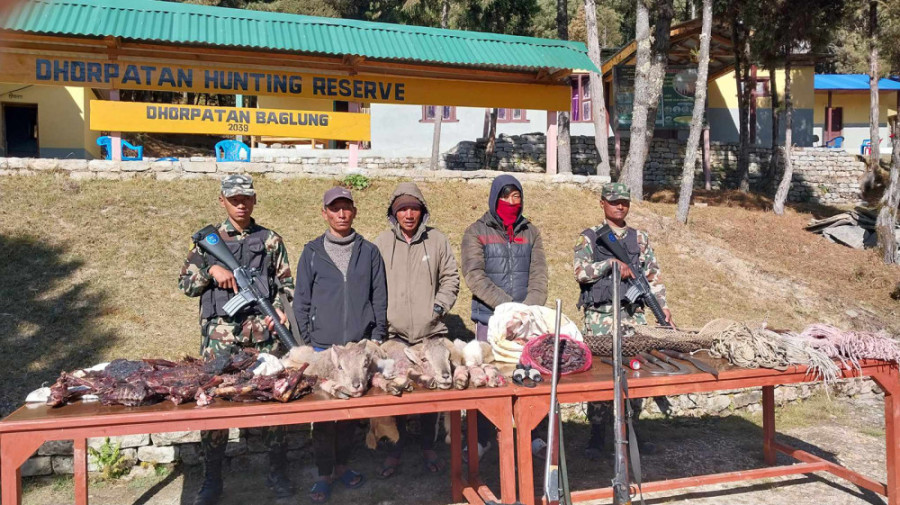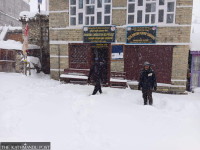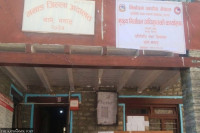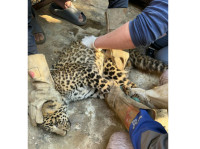Gandaki Province
Dhorpatan struggling to check poaching, timber smuggling
The hunting reserve faces poachers without sufficient security presence.
Prakash Baral
Security lapses have marred conservation efforts in Dhorpatan, the only hunting reserve in Nepal. Poaching of animals, as well as birds, and smuggling of medicinal herbs and timber go unchecked due to poor security presence in the reserve.
On Tuesday, the reserve arrested three poachers with two muskets, one binocular, and 102 sets of animal traps, among other things, from the Barse block. Of late, the reserve administration and Bebi Baks Battalion of Nepal Army posted for the security of Dhorpatan have launched a search campaign in the area.
According to the reserve administration, a total of 19 suspected poachers were arrested while 10 weapons were seized over the past five months. Security personnel and the reserve employees seized around 5,000 kilograms of medicinal herbs of various species and 1,500 cubic feet of timber during the same period.
Spread over 1,325 square kilometres, the hunting reserve is in the Dhaulagiri mountain range in Baglung, Myagdi, and Rukum East districts. Sixty percent of the reserve’s area lies in Rukum East, covering much of the Putha Uttarganga Rural Municipality. There is not even a single security post.
“The poachers target endangered birds and animals including musk deer. Lack of security presence and shortage of human resources in the existing security posts are the main problems in controlling the poaching and smuggling,” said Birendra Raj Kandel, the chief conservation officer at the reserve. He urged the authorities concerned to arrange security measures and adequately staff the reserve to make conservation efforts more effective.
According to Kandel, there are a total of 72 employee positions in the reserve, but only 55 employees.
Dhorpatan Hunting Reserve was established in 1983. The notice of the decision was published in the Nepal Gazette four years later. The reserve is home to 32 species of mammals, 137 bird species, several species of medicinal herbs and trees. Himalayan blue sheep, leopard, goral, Himalayan tahr, black bear, barking deer, wild boar, pheasant, and partridge are the major animals and birds found in the reserve. Some endangered birds and animals including musk deer, red panda, cheer pheasant and Danphe (lophophorus], which is Nepal’s national bird, are also found in the reserve.
The Devi Baks Battalion of Nepal Army has been deployed to provide security in the reserve. But it does not have a security post in East Rukum that holds 60 percent of the reserve area. The Army provides security only at the reserve’s headquarters in Patan, the entry point at Deurali of Baglung and the Gurjaghat area in Myagdi.
Kandel complains that the reserve faces administrative hurdles in its conservation efforts due to the lack of police presence in the Patan area. According to him, the reserve has no alternative but to inform the police over the telephone and prepare a crime scene report with the help of Nepal Army in case any illegal weapons, animal body parts or smuggled wood and herbs are seized in the reserve area.
The closest police post from the reserve is in Bobang, which is around 20 km from the reserve’s headquarters. A police post in the Patan area was shifted to Bobang during the Covid pandemic leaving the reserve facing administrative hurdles in taking swift actions against any illegal activities in the reserve.
Each year, the government allows hunting enthusiasts to hunt specific species of animals in the reserve. The Department of National Parks and Wildlife Conservation issues permits to hunt a specified number of Himalayan blue sheep, tahrs and wild boars through competitive bidding. Hunting is allowed in two seasons—the first season runs from mid-September to mid-December and the second season from mid-February to mid-April. Hunters can enter the hunting block with a liaison officer and the reserve’s permit. The hunters cannot hunt the animals at night, nor kill babies and females.




 9.7°C Kathmandu
9.7°C Kathmandu.jpg)











